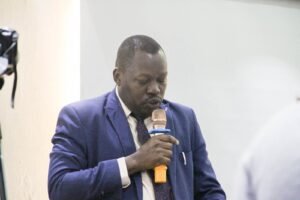Guya Scopas Bethuel, Juba – The International Organization for Migration (IOM) in South Sudan and the government are urging journalists and civil society organizations to take a more active role in combating human trafficking and smuggling.
The call was made at the Glory Regency Hotel in Juba following a one-day training event aimed at raising awareness and providing ethical reporting guidelines for the media and civil society.
More than 40 Journalists and civil society representatives from various media houses and organizations across the country participated in the event organized by IOM and partners such as GiZ, the European Union, the Ministry of Interior, and the United Nations on Drugs and Crime.

Senior Counsel Sabri Wani delivering remarks at the event
Key figures such as Angelina Teny, the Minister of the Interior, and Sabri Wani, Chairperson of the National Counter-Trafficking and Smuggling of Migrants, spoke about the ongoing challenges in tackling human trafficking.
The country struggles with a lack of legal frameworks, porous borders, and economic hardships that contribute to the prevalence of trafficking and smuggling. However, efforts are being made to pass a bill that would address the prevention, prosecution, rehabilitation, and repatriation of victims.
“Human trafficking is a global issue affecting 27.6 million people,” said Wani.
He said the country is working on a bill to provide a legal framework that will deal with trafficking issues.
Angelina Teny, the minister of the Interior, acknowledges the challenges the ministry is faced with but added that efforts are being made.
“As a ministry, we have ever made arrests, but we got stuck because of lack of the legal provision to prosecute perpetrators,” said Angelina.
The minister said that government institutions deal with the crime itself majorly unlike the prevention.
“Often government institutions deal with the crime, but prevention is where you can play a role.” Said Angelina.
Wani asked the journalists and the civil society representatives to lobby for the acceleration of the passing of the bill.
He said they are working with stakeholders like IOM and others to educate teachers, students, parents, members of civil society, and journalists that will enable the country to combat the crime of trafficking of persons.
Gagy Abdelnaby, Representing IOM South Sudan, said Migration is ever-evolving and becoming more complex than ever before.
“Today migration is not only driven by conflict but also by new push factors such as economic disparities and climate inducement; thus, it requires a forward-thinking approach and commitments from both national governments, regional intergovernmental organizations, civil society, and international partners.” Said Abdelnaby.
He said South Sudan continues to be a source and destination for migrants, refugees, labor migrants, and asylum seekers from various countries.
Besides the migrants coming in, there are close to 2 million Internally Displaced Persons who need protection.
Abdelnaby said many migrants are exposed to many forms of exploitation like forced labor, domestic servitude, and forced and early marriage, among others, which constitute trafficking in persons.
“We call upon all stakeholders, including the media and civil society, to take an active role in educating the population in South Sudan on forms of trafficking and their impacts on the victims, their families, and the whole society. This calls for collaboration to prevent this vice,” said Abdelnaby.
Despite the absence of specific legislation, South Sudan has legal frameworks like the Penal Code 2008, the Immigration and Passport Act, the Child Act 2008, the SPLA Act 2008, the Labour Act 2017, and other international treaties to fight trafficking.
Last year, South Sudan ratified the United Nations Convention against Transnational Organized Crimes. This is in addition to the Convention on the Rights of the Child, and the Convention on the Elimination Against all Forms of Discrimination against Women
However, a stronger and more comprehensive response is needed to address the complexities of modern migration and human trafficking.
The event concluded with a call for greater collaboration between the media, civil society, and the government to educate South Sudanese citizens on the realities of trafficking and its devastating impact on individuals, families, and communities as well as pushing for legislative changes.



